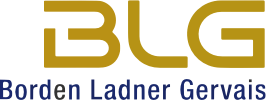About BLG

5 Offices 700 Attorneys
Borden Ladner Gervais LLP (BLG) is the largest law firm in Canada, with broad practices in both business and litigation spread across five large offices. They are constantly looking for ways to innovate to surpass client and internal expectations.
James Mathers is a senior partner in BLG’s Financial Services Group, whose practice includes both transactional and advisory work for financial institution and other clients. James spearheaded the launch of Closing Folders within the firm. Eva Sommer is BLG’s Knowledge and Innovation Lawyer for the Business Law Groups. She is responsible for rollout and adoption of legal technologies which includes Closing Folders.
Background
James Mathers learned about Closing Folders at a local lawyers group. “Closing Folders seemed to have actually delivered a product that brought together a bunch of ideas I’d had or heard of for a long time,” states Mathers. In March 2017, BLG started a pilot project with the tool, and within months of that they were live with over 30 active users and 50 active deals per month. As of the end of 2018, each month BLG had over 100 active internal users, 200 active deals, and 50 active external users. Most importantly, BLG was producing over 100 closing books a month for its clients using Closing Folders – reducing an hours-long process to a few clicks.
User Adoption & Deployment
Closing Folders is a cloud application which can be deployed in a variety of flexible and secure configurations. “Being cloud-based, it was not a strain on our IT group after they did due diligence,” Mathers stated, “and Closing Folders is easy enough to use that we didn’t need to involve our IT trainers, who had other commitments.”
Sommer reported that “Initial uptake was good and lawyers were impressed with what they saw, particularly the ease with which signature packages could be generated and the speed with which closing books could be created.”
BLG does not mandate the use of Closing Folders. Mathers found different people react differently to new technology. Accordingly, BLG adopted a flexible approach to promoting widespread adoption of the tool.
Tips to Achieve Strong Internal Adoption
Mathers and Sommer summarize their experience with five recommendations.
- Start Small
Getting your first transaction under your belt on Closing Folders is key to adoption. However, trying new technology on a complex deal with a tight timeline might lead to frustration. Sommer recommends starting with something simple. “We typically encourage users to have a less stressful first experience on Closing Folders – start with doing a closing book after the deal is finished, or try a digital closing on a smaller, simpler transaction without a tight timeline,” stated Sommer.Mathers offers a recommendation on this theme as well. “One of our big messages has been that Closing Folders can be implemented in varying degrees depending on user comfort levels. We want senior lawyers who are responsible for transactions to promote Closing Folders, but they don’t actually have to interact much with the tool. Often junior lawyers, paraprofessionals or assistants will do the ’heavy lifting’ and other lawyers won’t do anything at first.” - Find an internal expert who can help train new users “just in time”
“One of the first things we did was ask one of our paraprofessional team members, who had shown an aptitude for technology and was responsible for preparing a lot of record books, to become an expert in using Closing Folders,” said Mathers. “We encouraged new users to experiment with Closing Folders on their own, but she provided ‘just in time’ training for them when needed.” - Provide Self-Help Tools
BLG promoted Closing Folders internally in as many ways as they could, establishing a home page for Closing Folders on their intranet with tip sheets, introductory videos, recorded training sessions and links to Closing Folders’ own training materials. “We also established an internal email address so that a group of expert Closing Folders users could provide assistance to others,” said Mathers. - Keep it Top of Mind
Keeping Closing Folders top-of-mind for busy lawyers and staff was a key initiative. BLG staff played Closing Folders videos on screens in the office coffee areas, visited practice groups to talk about the program and featured it in reports to partners and other groups within the firm as an example of innovation. - Involve the Entire Team by Running Mock Deals
BLG holds small group training sessions with deal teams to run mock deals within Closing Folders. Sommer: ”We find this approach can help transactional teams better visualize the workflow and give them the confidence they need to adopt and use the technology.”
Benefits from Using Closing Folders
Response to Closing Folders has been very favourable within BLG. Vincent Frenette is the Managing Partner of the Financial Services Group in BLG’s Montreal office. Frenette sees five main benefits using Closing Folders:
- Reputation as a technology adopter: “We look good to the clients and to the other firms by showing that we are early adopters of technology.”
- Clients have direct visibility on a deal’s progress. “Clients are amazed to be able to see what is going on in their deal by simply logging in.”
- Workflow and action. “On a lending transaction, satisfying the conditions precedent of a business nature is made easier by the various parties simply uploading those in the system for the lender to review.”
- Professional Closing books delivered quickly. “Custom-branded closing books are delivered literally minutes after closing.”
- Reporting and deal visibility. “With digital closings you have all the information about all of the deals you’re working on at your fingertips.”
Table of contents
